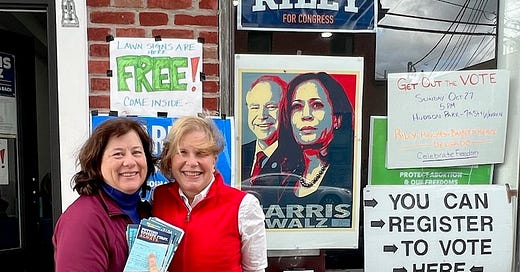I received an email this morning from Richard Higgott, lead author of the chapter “The Strongman Problem” in our Women and Leadership. He sent an article from Foreign Affairs that defines Kamala Harris as “a former prosecutor who emphasizes that her entire career has been devoted to upholding US law.” Simple, clear, with none of the rounded edges, the softening of the profile, that has seemed necessary for women candidates for office.
I begin to wonder who needed those rounded edges when I read the latest information about women voters - even white women voters in the Rust Belt - and when I thought about what I’d seen as I did some canvassing in upstate New York. Was it women who were uncomfortable with toughness and ambition, or was it men?
Talking to women in Columbia County
I was fortunate last weekend in being able to team up (photo above) with Tricia Farley-Bouvier, the Massachusetts state representative from Pittsfield. We happened to turn up at Democratic headquarters in the New York 19th Congressional District, the upstate swing district just over the border, at the same time and recognized each other from meetings about the Train Campaign. This was lucky for me because Tricia is, naturally, an experienced door knocker and campaign talker.
What is it like to knock on a stranger’s door and try to talk to them about a contentious election? It was a Saturday morning, so many people were at home. Tricia knew just what to do, and used the canvassing app to guide me to the rural road where we had a set of house numbers to call on. We did not talk about the fact that in the US there’s an unnerving element to going up to a stranger’s house. We weren’t far from where a college student was shot and killed when the car she was a passenger in took the wrong driveway.
After going to a couple of doors with Tricia, I started taking houses alone. One of them stood in a sort of compound created by rusty farm equipment and tarp-covered piles. All the curtains were closed and I confess that my knocks were not very loud. (Door knocking turned out to be literally what we did - few houses had doorbells.)
After talking to some Democrats, all saying they would be enthusiastically voting and voting early, I knocked on three doors where I was politely turned away with the words, “We’re Republicans.” Each time the door was opened by a woman. None said they were “voting Trump.” Afterwards, I wished I’d been prepared to say, “I hope you’ll consider splitting the ticket, and voting Republican as well as for Kamala Harris.”
I’ve heard, even here in Blue Massachusetts territory, of women who have stopped discussing the election with their leaning-Red husbands. After seeing some of the latest polls, and watching the Harris campaign’s advertisement encouraging women to ignore their husbands and vote for Harris, I am beginning to think that the women who turned me away at the door might not have needed a pitch from me.
Here’s the Harris campaign ad that has the right wing men flipping out:
Tricia told me about an exchange she had with a couple coming out of their house. She said hello, introduced herself, and addressed them by name as she opened her pitch, “Election Day's coming up and I just want to check in with you and see what you're thinking, what's on your mind.”
The brawny man snapped that he was Republican and “I would never vote for someone who kills babies.”
Tricia turned to the wife and said, “Candice, how about you, what are you thinking?”
“I’m not thinking,” Candice said, shaking her head, “I’m just not thinking about it any more.”
Maybe she’s just not talking about it.
The Ballot
Chapter 20 of Anthony Trollope’s Phineas Finn (1869) is memorable as an account of public speaking - the new legislator, known from boyhood as an orator, makes his first speech in parliament and it’s a disaster. The subject is “the ballot,” which is never explained because Trollope’s readers would have understood that it meant the secret ballot: voting in private, not in public.
Phineas had made up his mind very strongly that he would always oppose the ballot. That he would hold the same opinion throughout his life, no one should pretend to say; but in his present mood, and under the tuition which he had received from Mr. Monk, he was prepared to demonstrate, out of the House and in it, that the ballot was, as a political measure, unmanly, ineffective, and enervating. Enervating had been a great word with Mr. Monk, and Phineas had clung to it with admiration.
The working class was in favor, the establishment was opposed. And a short time later, in 1872, the UK Parliament passed the Ballot Act. We in the United States lagged far behind, but eventually, in the 1890s, we adopted a secret ballot. Here’s how an article in Humanities magazine described the change:
Today the secret ballot is assumed to be a fundamental part of democracy. But for most of America’s history voting was a highly public act. Spectacularly public even, accompanied by boisterous crowds, partisan hecklers, torchlight parades, free-flowing whiskey, and brawling.
What would those 19th-century politicians and activists say if they knew we would be talking about the privacy of the ballot in 2024? I’m told that my father thought it was amusing to claim that his wife would always know how to vote, and perhaps that’s why my mother, as she would put it, kept her nose out of politics. For how many women has this been the case?
In the US presidential election of 2000, last-minute efforts to get voters to the polls has been credited with Al Gore Jr’s winning the popular vote across the country (he, however, conceded the election to George W Bush after a ruling by the Supreme Court). Since then, door knocking - also called blockwalking and foot canvassing - has become a standard part of the “ground game” of modern politics in the United States, the UK, and a few other countries.
But how did candidates work the ground game in earlier times? Here is an example from another Trollope novels, Dr Thorne:
The two parties had outdone each other in the loudness of their assertions, that each would on his side conduct the election in strict conformity to law. There was to be no bribery. Bribery! who, indeed, in these days would dare to bribe; to give absolute money for an absolute vote, and pay for such an article in downright palpable sovereigns? No. Purity was much too rampant for that, and the means of detection too well understood. But purity was to be carried much further than this. There should be no treating; no hiring of two hundred voters to act as messengers at twenty shillings a day in looking up some four hundred other voters; no bands were to be paid for; no carriages furnished; no ribbons supplied. British voters were to vote, if vote they would, for the love and respect they bore to their chosen candidate. If so actuated, they would not vote, they might stay away; no other inducement would be offered. . . .
It certainly did appear on the morning of the election as though some great change had been made in that resolution of the candidates to be very pure. From an early hour rough bands of music were to be heard in every part of the usually quiet town; carts and gigs, omnibuses and flys, all the old carriages from all the inn-yards, and every vehicle of any description which could be pressed into the service were in motion; if the horses and post-boys were not to be paid for by the candidates, the voters themselves were certainly very liberal in their mode of bringing themselves to the poll. The election district of the city of Barchester extended for some miles on each side of the city, so that the omnibuses and flys had enough to do. Beer was to be had at the public-houses, almost without question, by all who chose to ask for it; and rum and brandy were dispensed to select circles within the bars with equal profusion.
Disputes over money were the order of the day, and it seems that times haven’t changed, at least for Elon Musk. Heather Cox Richardson quotes a report from Wired:
Door-knockers for Musk’s PAC were driven around in the back of a U-Haul without seats and threatened with having to pay their own hotel bills if they didn’t meet high canvassing quotas. One of the canvassers told Lahut that they thought they were being hired to ask people who they would be voting for when they flew into Michigan, and was surprised to learn their actual role. The workers spoke to Lahut anonymously because they had signed a nondisclosure agreement.
Plus ça change plus c'est la même chose, we sigh. Yet today, this week, we hope and work for a change that will echo down the years, just as the Ballot Act has.







My mother was a Stevenson Democrat and my father an Eisenhower Republican. There was never any doubt - or arguments about - the fact that each would vote their conscience. Of course, we are now living in frightening times in this country where even the impossible thought of a civil war lurks.
1) Yes, women will save the world. (2) I just spent a week door-knocking in a pink county of Pennsylvania. I drove up one long winding driveway and at the top, started a man and woman who had just gotten into their car. I asked for the woman by name, since only her name was on my list. She put her hand up inside the car. Immediately, her husband started yelling at me -- "What do I think I'm doing?! Get the hell off my property!", etc. I left with a wave, but now I'm worried that I outed the woman as a Kamala supporter when maybe she had been telling her husband she supports Trump. It was a real Handmaids moment. After that, I started parking at the bottom of the driveway and walking up, which felt less intrusive than driving up to their house. These are people who live way up in the woods, in part because they don't want people like me to knock on their doors.